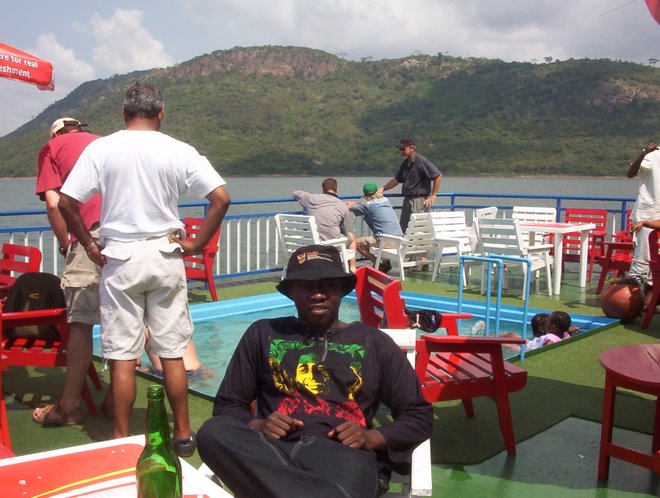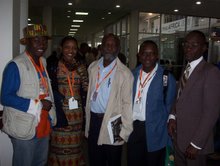SECURITY reports of the emergence of gangsters in some surburbs of Kumasi, has once again brought to the fore, the growing security challenges of the metropolis.
Clearly, the once peaceful metropolis of Kumasi is gradualy gaining notoriety for heinous crimes, a situation which continue to put fear in many residents.
This comes in spite of strenuous efforts by the security services to nib the canker in the bud.
Startling revelations about the rate at which gangster lifestyles were gaining roots among the youth in the metropolis, had drum home the need for the police and other security agencies to double their efforts in security control and checks.
A recent case of gangster activity is the manner in which 26-year-old goldsmith, Jordan Osei Yaw, was axed to death by some assailants who attacked him in his room at South Suntreso while he was sleeping on November 24, 2007.
The Police revealed that the deceased was murdered by a gang of six youth based at Bantama in Kumasi.
Using machetes, axe, cutlasses and other sharp objects the gangsters nicodemously entered the deceased’s bedroom and brutally inflicted deep wounds on the head, neck, palms, back and other parts of the body of the deceased, leaving him to bleed to death.
The deceased was said to belong to a rival gang based at Asante New Town and that his gang is also said to be seriously planning to revenge his death.
Undoubtedly, the murder was one of the most serious ever to occur in the metropolis.
Other serious crimes have occurred but in those cases the victims were either shot or stabbed to death. And in those cases it was not under circumstances such as this latest one, where the assailants boldly entered a house, walked past three or four rooms and entered the young man’s room to finish him in just a matter of seconds armed with dangerous implements such as cutlasses and axes. Nothing was stolen from the room, thus ruling out robbery.
That something needs to be done swiftly to help avert such crime would be an understatement.
It is an undeniable fact that present day modernisation has its own set of disadvantages one of which is an upsurge in crime as cities develop and expand. But it should be noted that the rate at which the crime wave is increasing in the Kumasi metropolis is unprecedented and very dangerous to residents.
In 2004 for instance some youth from Asawasi and Zongo clashed under inexplicable reasons leaving behind a number of casualties as they used very dangerous implements to slash themselves and destroyed property worth millions of cedis belonging to law abiding citizens.
One person from Asawasi had one of his fingers severed off while another from Zongo had his right wrist also severed.
On the dawn of January 1, 2004, similar gangs struck at various areas in the metropolis and succeeded in robbing members of the public who attended watchnight service and were on their way home. Some victims were inflicted with cutlass wounds and reported to the Komfo Anokye Teaching Hospital (KATH) for medical attention.
It is difficult to fathom the direction the present generation is heading where people would want to take the law into their hands and settle personal scores with murder. This sort of behaviour is alien to Ghanaian culture.
Although in the recent case of the murder of Yaw Jordan, the motive for the murder was yet to be officially identified, information gathered as of now, points to the fact that it is likely a matter of retaliation.
A few years ago, apart from the central business area, to be specific Kejetia and the Central market where pickpockets used to rob people of their monies and personal belongings, the entire city was peaceful and the crime wave was minimal.
Even with those robbery cases, the perpetrators resorted to stealing on the quiet and taking to their heels. In those times, no force was applied by the pickpockets. They snatched people’s bags at public places and took to their heels.
And they always tried to steal on the quiet where no one was looking. And in those cases too, the robbers mainly chose people they perceived to be naive and ignorant and whose appearances, especially dressing and movements indicated that they were new in town and had probably just arrived in town either from the hinterlands or a different part of the country.
In those days, it was only Kejetia and the central market which was perceived to be very fearsome when it came to matters of robbery.
But the opposite is what is happening today where the crime wave has spread to all parts of the metropolis.
Hitherto burglars went into people’s homes without arms and ammunitions. They resorted to sneaking into people’s homes under the cover of darkness, steal items unnoticed and run away. They either entered people’s homes when no one was around in the afternoon or when the people were sleeping at night and secretly and silently steal and run away, quietly unnoticed.
But these days the robbers strike in broad daylight with weapons and ammunitions. Even when this menace started the robbers normally resorted to the usage of masks to cover their faces to at least go about their activities with their identity not being known.
Surprisingly the trend has changed in latter days and many of these armed robbers go about their operations boldly without covering their faces. You dare challenge them during an attack on you, and you would be counted among the dead.
It is dangerous to enter a taxi these days at night since many taxis in the metropolis are loaded with robbers. They forcibly take away people’s mobile phones and money and throw them out of moving taxis.
About five years ago, a new trend of crime emerged in the metropolis where young men organised themselves into gangster groups nicknaming themselves, “Al Qaeda”, “Taliban” and “Akata” and resorted to fighting among themselves with dangerous implements such as guns, knives and cutlasses as well as harassing, terrorising and robbing lawful citizens of personal belongings on the streets.
When these activities started, the perpetrators approached people without wearing masks and demanded that you hand over your mobile phone and money.
Woe unto you if you had no mobile phone or money on you to offer them, or you dare them, and you end up being slashed with a knife to serve as a remembrance for you never to challenge them.
I recall a case where a friend of mine was slashed for carrying a mobile phone which his attackers claimed was not an expensive one and in another case where someone was also slashed for not carrying a mobile phone or money on him. In those cases the attackers were said to have warned them to carry along with them cash and expensive mobile phones so that the next time they happen to come across them, their booty would be worthwhile.
When the activities of these young men were reported in the media, the city authorities and the Ashanti Regional Co-ordinating Council (ARCC) then under the leadership of Mr Sampson Kwaku Boafo, Member of Parliament for Subin and former Ashanti Regional Minister blamed the media for over estimating the issue and argued that the media was reporting it as if the entire city of Kumasi was under siege.
I could then understand the Minister’s plight to some extent since as the political head of the region he did not want his region to be perceived as a hub of criminals but rather a peaceful place.
He equally blamed the crimes on modernisation and attributed it to the development of the city and gave the assurance that the security agencies were on top of the issue.
To me the media did what was right and adequately reported on the issue. The media at the time even helped in bringing the situation under control since security was beefed up with the Police Service bringing on board more personnel from other regions to help maintain peace in the region.
That is not to say that security in the region has lapsed in recent times thus the recent upsurge in the crime.
The gangster groups still exist on the quiet in the metropolis and occasionally strike.
I want to believe that the security agencies are up to the task and doing their possible best to clamp down on the menace. To me the security services would succeed in combating this menace if the public would cooperate by volunteering information.
![]()



















